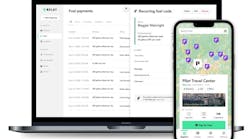COMPANY:
Roadway Express Inc.
Akron, OH
OPERATION:
LTL pickup and delivery
Bill Mitchell
manager, operations planning and engineering
Problem:
Pushed by a visionary CEO, Roadway Express was an early adopter of Internet technology. The fleet moved to web-based shipment tracking in the mid 1990s when the competition was still relying on toll-free numbers and customer-service reps to handle tracking inquiries. As one of North America's largest LTL carriers, Roadway picks up and delivers a huge number of shipments every day, so tracking that freight in near real-time was a major achievement.
The one bottleneck in the system involved getting information from its P&D operation at the beginning and end of every shipment.
“In 1992 we started a pilot program in Cleveland with some of the early (wireless data) technology to get that information at the point of pick up and delivery,” says Bill Mitchell, manager of operations planning and engineering. “We ran it for a few years, but at that time the cost of the service and hardware was just too high to justify.”
The fleet continued to rely on two-way radios for verbal dispatch and to batch most of the freight data at the end of the day when the driver returned to the terminal. “The only exceptions were some large or time-sensitive shipments where we had the driver call in the information.”
Solution:
New wireless systems and hardware have changed the cost equation for gathering real-time data from P&D routes. Last year, Roadway “re-energized the pilot at a smaller facility,” says Mitchell. “We put in a number of systems from different vendors and ran them side-by-side.”
Once the fleet decided that Qualcomm's new land-based OmniExpress system was best for it particular operation, Roadway rolled out test units at five sites to determine a return-on-investment timetable.
In January, the fleet decided to move ahead with a major deployment of the wireless data system. Although Mitchell declines to say how many Roadway P&D trucks will carry OmniExpress, he says that it will install the wireless system at its 20 largest metropolitan area terminals by this fall.
A relatively new service for Qualcomm, OmniExpress sends data over the Sprint PCS digital network at a lower service cost than the company's original OmniTRACS satellite service. It can provide two-way messaging and vehicle tracking, as well as integrate with a variety of fleet management systems.
For Roadway, that integration is the real key to cost-justification of the new system. On pickups, Roadway will use the real-time information to feed its outbound load planning systems — speeding up that process — as well as to confirm pickups for the tracking system. On the delivery side, data sent over OmniExpress will be fed into the customer tracking system to improve freight visibility.
“This lets us extend our communications and tracking systems to the customer's doorstep,” says Mitchell. “We gather the information more quickly, provide it to the customer faster, and in general communicate more efficiently with our P&D fleet.”


